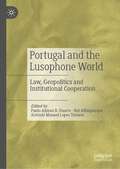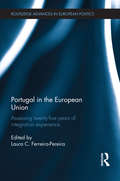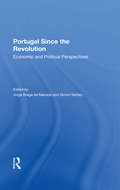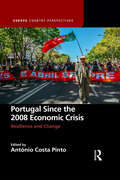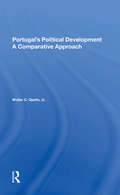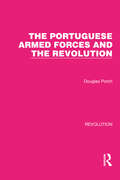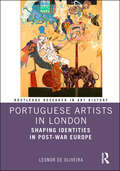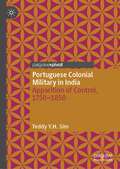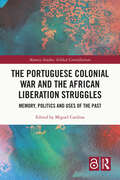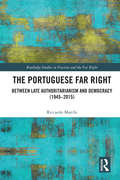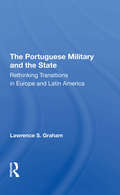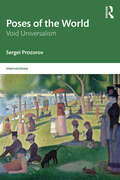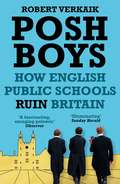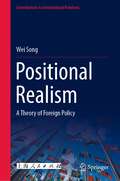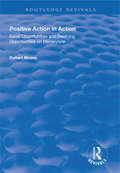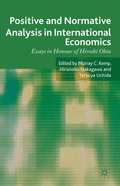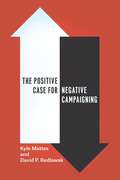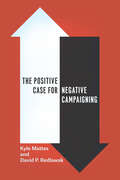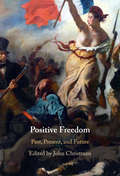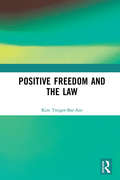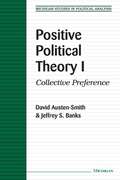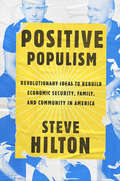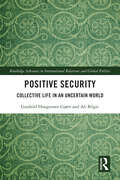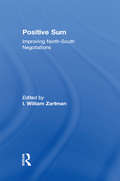- Table View
- List View
Portugal and the Lusophone World: Law, Geopolitics and Institutional Cooperation
by Paulo Afonso B. Duarte Rui Albuquerque António Manuel Lopes TavaresThis book responds to a serious need for a consistent and comprehensive publication which combines an analysis of Law, Geopolitics and Institutional cooperation within the Lusophone world. Research in the book includes contributions from scholars with diverse educational and professional experiences working in these disciplines, from all around the world. The book will assist readers in comprehending, recognizing and discussing on-going debates about the Lusophone world in the 21st century.
Portugal in the European Union: Assessing Twenty-Five Years of Integration Experience (Routledge Advances in European Politics)
by Laura C. Ferreira-PereiraThis book examines the involvement of Portugal in the European integration process since the country signed the Accession Treaty in 1985. The volume elicits how Portugal has grasped opportunities and challenges emanating from its participation in the institutional, regulatory and political frameworks of the European Union (EU), as these have become more intricate as well as intrusive. It scrutinizes the adjustments and transformations that have taken place in Portuguese society, politics and economics as well as in the country’s international relations, as engendered by its increasing enmeshment in the Community-building dynamics. It is divided into three main parts: • Part I focuses on the major changes within the domestic arena, notably on the political, economic and social fronts; • Part II addresses the adjustments that the Portuguese leadership had to make in order to secure the country's participation in key common policies and strategies; • Part III is centred on foreign policy and assesses and discusses the impact upon Portugal’s international relations. This book will be of interest to students and scholars of European politics, EU studies, comparative politics and those with a strong interest in Portugal.
Portugal Since The Revolution: Economic And Political Perspectives
by Simon Serfaty Jorge Braga De MacedoThis volume examines the economic and political circumstances in Portugal since the 1974 revolution. A succinct analysis of the central themes of Portuguese politics (drawing on public opinion surveys conducted in Portugal) is followed by a framework for analyzing the economic consequences of the coup. The authors then assess the influence of the I
Portugal Since the 2008 Economic Crisis: Resilience and Change (Europa Country Perspectives)
by António Costa PintoPortuguese democracy is now celebrating its 50th anniversary. Portugal joined the European Union (EU) in 1986, but the enduring legacies of the country’s transition process from authoritarianism to democracy became apparent during the European sovereign debt crisis, when Portugal experienced its third bailout since the institutionalization of democratic government. Although the first decade after EU accession was one of slight growth and investment, Portugal’s economy has, in effect, been performing poorly since the beginning of the 21st century. Among the major changes in Portuga - as in much of Southern Europe - as a result of the ‘great recession’, was the emergence of important new actors, including populist parties, new social movements and the polarization of attitudes toward the EU. In some of these areas, the phrase ‘with the exception of Portugal’ was always present. This book explores the factors that might explain why this is no longer the case, presenting a global overview, with an interdisciplinary focus, of the processes of economic, social and political changes in Portuguese democracy since the 2008 economic crisis. The volume is accessible to a broad academic audience, with chapters examining economic, political, social and foreign policy issues, for scholars interested in an analysis of Portugal’s emergence from the economic crisis.
Portugal's Political Development: A Comparative Approach
by Walter C Opello JrPortugal's early developmental experience created a highly centralized administrative state that continues to have a powerful influence on the nature and style of the country's government and politics. Emphasizing this theme, Dr. Opello shows that, contrary to the conclusions of scholars who have analyzed Portugal from Latin American or Third World perspectives, Portuguese political development is more comparable to the pattern of development of West European countries, especially France. He compares Portugal's political experience with that of other West European countries and concludes by speculating about the future of Portugal's fledgling democracy.
The Portuguese Armed Forces and the Revolution (Routledge Library Editions: Revolution #23)
by Douglas PorchThis book, first published in 1977, traces the origins of the left-wing Portuguese army rebellion of 1974 that overthrew the 50-year-old authoritarian regime of Prime Ministers Salazar and Caetano to the traditional political independence of the armed forces, their increasingly strained relations with the regime, and finally to the colonial wars which brought professional discontent to boiling point. The Portuguese revolution which followed provides a unique laboratory for the study of an army in crisis, the strains which the attempt by officers to direct the political life of the country after April 1974 placed on military organisation; the traditional career patterns and attitudes of soldiers and on discipline. It examines the role of officers in government and the day-to-day problems which political upheaval created in every barracks. This is a study both of the armed forces in politics and politics in the armed forces, placed within the larger context of the revolution.
Portuguese Artists in London: Shaping Identities in Post-War Europe (Routledge Research in Art History)
by Leonor de OliveiraThis book centres on four Portuguese artists’ journeys between Portugal and Britain and aims at rethinking the cultural and artistic interactions in the post-war Europe, the shaping of new identities within a context of creative experimentalism and transnational dynamics and the artistic responses to political troubles. Leonor de Oliveira examines the contributions of the work of Paula Rego, Barto dos Santos, João Cutileiro and Jorge Vieira, among other artists, to shape referential images of Portuguese identity that not only responded to the purpose of breaking with dominant iconographic and aesthetic representations but also incorporated a critical perspective on contemporaneity. This title will appeal to scholars interested in art history, Portuguese and European art, and the mid-twentieth-century art scene.
Portuguese Colonial Military in India: Apparition of Control, 1750--1850
by Teddy Y.H. SimThis book explores and analyzes developments in the military institution, military engagements as well as the larger security environment of (including non-war violence and maritime regions linking to) the Portuguese Empire in India. These developments occurred under the onslaught of the early modern globalization. The research shows that far from being dilapidated or archaic, the Portuguese colonial military there kept up with some developments in technology and organization in a competitive environment. Although the colonial military was not the most important reason in accounting for the survival of the Portuguese Estado da Índia, nor was the military profession the most lucrative occupation, the Portuguese experience gave indication of how a colonial state and society was able to survive against coalescing threats from the position of weakness. Located in the period and geographical region of the wax and waning of the Mughal and Maratha empires, Portuguese India was not necessarily a more violent place than the surrounding territories although resistance to and uprising against the Portuguese was usually underestimated. Beginning from the attempt at political and military centralization (and standardization) in the eighteenth century, the abolition of the army of the Estado da Índia in the nineteenth marked nominally the end of an era that may have a reverberation on the pacifist perception of Goa today.
The Portuguese Colonial War and the African Liberation Struggles: Memory, Politics and Uses of the Past (Memory Studies: Global Constellations)
by Miguel CardinaThe Portuguese Colonial War and the African Liberation Struggles: Memory, Politics and Uses of the Past presents a critical and comparative analysis on the memory of the colonial and liberation wars that led to a regime change in Portugal and to the independence of five new African countries: Angola, Mozambique, Guinea-Bissau, Cape Verde and São Tomé and Príncipe. Covering more than six decades and based on original archival research, critical analysis of sources and interviews, the book offers a plural account of the public memorialization of this contested past in Portugal and in former colonized territories in Africa, focusing on diachronic and synchronic processes of mnemonic production. This innovative exercise highlights the changing and crossed nature of political memories and social representations through time, emphasizing three modes of mnemonic intersections: the intersection of distinct historical times; the intersection between multiple products and practices of memory; and the intersection connecting the different countries and national histories. The Portuguese Colonial War and the African Liberation Struggles: Memory, Politics and Uses of the Past is the major and final output of the research developed by CROME – Crossed Memories, Politics of Silence, a project funded by a Starting Grant (715593) from the European Research Council (ERC). The book advances current knowledge on Portugal and Africa and deepens ongoing conceptual and epistemological discussions regarding the relationship between social and individual memories, the dialectics between memory, power and silence, and the uses and representations of the past in postcolonial states and societies.
The Portuguese Far Right: Between Late Authoritarianism and Democracy (1945-2015) (Routledge Studies in Fascism and the Far Right)
by Riccardo MarchiThe book discusses the far right in the contemporary Portugal (1945-2015) within three different periods: the end of the authoritarian regime of António de Oliveira Salazar (1945-1974), the transition to democracy after the coup d’état of April 25th (1974-1982) and the democratic regime until the present (1982-2015). The analysis focuses on political groups and parties, social movements, ideologies, intellectuals and publications acting at the extreme right of the political spectrum of the Portuguese authoritarian regime and of the democratic regime, both on a national and international level. The book also contextualizes the Portuguese far right within the political thought and the organisational models of the wider European extreme right. A qualitative in-depth case study and the outcome of ten years of research, this book offers analysis of historical and contemporary primary sources, previously unexplored archives and in-depth interviews. Assessing the extent to which the behaviour of the far right is altered in different political environments and situations, this book makes an innovative and unique contribution to scholarship on the extreme right within southern Europe and will be of interest to students and scholars researching extreme right politics, as well as European history and politics more generally.
The Portuguese Military And The State: Rethinking Transitions In Europe And Latin America
by Lawrence S GrahamLawrence S. Graham focuses on the implications of the Portuguese case for understanding more fully broader, cross-national patterns in politics and governance, showing how the Portuguese case may constitute an alternative model especially for Latin America and Eastern Europe.
Poses of the World: Void Universalism (Interventions)
by Sergei ProzorovPoses of the World develops a theory of the pluralistic coexistence of politics with aesthetic, scientific, ethical and economic procedures that have sought to influence, dominate or even replace politics. We are accustomed to saying that everything is political. It is true that politics has throughout history ventured into the domains that used to be non-political, be they art, science or economy. However, rather than being totally dominated by politics, our societies are marked by the coexistence of diverse procedures, whose logics are distinct but nonetheless remain in contact, ranging from frontal conflict to lasting syntheses. This book develops a theory of this pluralistic coexistence. It builds upon the findings of the first two volumes of Void Universalism to outline an account of pluralism that affirms the incommensurable character of the procedures that regulate the manners of our being and acting in the world. Neither reducible to nor insulated from each other, politics, ethics, art, economy, science and numerous other procedures persist in errancy without ever cohering into any overarching unity. The book demonstrates how the abandonment of the aspiration for such coherence opens up new perspectives on the key sociopolitical debates of our time, from the critique of neoliberalism to concerns over cancel culture. Systematic and accessible, this volume will be of interest to students and scholars of political science, philosophy, sociology, anthropology and cultural studies as well a wider readership beyond academia.
Posh Boys: How English Public Schools Ruin Britain
by Robert Verkaik&‘The latest in the series of powerful books on the divisions in modern Britain, and will take its place on many bookshelves beside Reni Eddo-Lodge&’s Why I&’m No Longer Talking to White People About Race and Owen Jones&’s Chavs.&’ –Andrew Marr, Sunday Times &‘In his fascinating, enraging polemic, Verkaik touches on one of the strangest aspects of the elite schools and their product&’s domination of public life for two and a half centuries: the acquiescence of everyone else.&’ –Observer In Britain today, the government, judiciary and military are all led by an elite who attended private school. Under their watch, our society has become increasingly divided and the gap between rich and poor is now greater than ever before. Is this the country we want to live in? If we care about inequality, we have to talk about public schools. Robert Verkaik issues a searing indictment of the system originally intended to educate the most underprivileged Britons, and outlines how, through meaningful reform, we can finally make society fairer for all.
Position of Power
by Meg ChorlianThe office of the U.S. president is designed to share power between the three branches of government—executive, legislative, and judicial. These three branches balance each other's power to keep the peace and respect the rules.
Positional Realism: A Theory of Foreign Policy (Contributions to International Relations)
by Wei SongThis book adopts the rationalist research path to bring forward an innovative theory of foreign policy, and the central question is: How can we define the overall national interests of great powers appropriately and thus help states make consistent and rational grand strategies? The answer can't be found among existing Foreign Policy Analysis and other theoretical research. In this book, Positional Realism is proposed as a new theory to define the overall national interests from the power position and order position perspectives and specify the four kinds of positional interests of hegemonic states, contending states, potential contending states, and non-contending states. Different great powers have different positional power and order objectives. Based on these positional interests, Positional Realism brings different foreign policy hypotheses and suggestions. The book also examines the six great powers in the nineteenth century to verify these hypotheses and finds that Positional Realism can not only convincingly explain the success or failure of their acts, but also give useful and important directions for strategy making of great powers.
Positive Action in Action: Equal Opportunities and Declining Opportunities on Merseyside (Routledge Revivals)
by Robert MooreFirst published in 1997, this volume describes very clearly the various government policies to promote equal opportunity and the context of urban policy in which they have to be implemented. Robert Moore’s important study addresses the key issue of equal opportunities through a case study of events when a change in government policy appeared to hold out the prospect of new jobs for a highly deprived inner city area. It is a model for all social research of this kind. The result is a very detailed and objective analysis of the problem of implementing equal opportunity policies in practice.
Positive and Normative Analysis in International Economics
by Murray Kemp Hironobu Nagakawa Tatsuya UchidaThis volume addresses important issues in international economics with contributions from an array of prominent researchers a manifestation of Hiroshi Ohta's cross-border research network and his passionate dedication to economics. Contributions range from studies on positive and normative trade theory, innovation in international trade and interactions between domestic and foreign firms and industries, to studies of a more empirical nature. The empiricalcontributions focus on preferential trading arrangements, global imbalances and exchange rates, as well asprovidingan in-depth analysis of the Japanese economy. The featured topics are explored from both positive and normative perspectives. Positive analysis describes how the economy functions, dealing primarily with what 'is'. Normative analysis is concerned with what 'should be'. This combined approach enables the formation of a base from which credible policy evaluation can take place. "
The Positive Case for Negative Campaigning
by Kyle Mattes David P. RedlawskTurn on the television or sign in to social media during election season and chances are you’ll see plenty of negative campaigning. For decades, conventional wisdom has held that Americans hate negativity in political advertising, and some have even argued that its pervasiveness in recent seasons has helped to drive down voter turnout. Arguing against this commonly held view, Kyle Mattes and David P. Redlawsk show not only that some negativity is accepted by voters as part of the political process, but that negative advertising is necessary to convey valuable information that would not otherwise be revealed. The most comprehensive treatment of negative campaigning to date, The Positive Case for Negative Campaigning uses models, surveys, and experiments to show that much of the seeming dislike of negative campaigning can be explained by the way survey questions have been worded. By failing to distinguish between baseless and credible attacks, surveys fail to capture differences in voters’ receptivity. Voters’ responses, the authors argue, vary greatly and can be better explained by the content and believability of the ads than by whether the ads are negative. Mattes and Redlawsk continue on to establish how voters make use of negative information and why it is necessary. Many voters are politically naïve and unlikely to make inferences about candidates’ positions or traits, so the ability of candidates to go on the attack and focus explicitly on information that would not otherwise be available is crucial to voter education.
The Positive Case for Negative Campaigning
by Kyle Mattes David P. RedlawskTurn on the television or sign in to social media during election season and chances are you’ll see plenty of negative campaigning. For decades, conventional wisdom has held that Americans hate negativity in political advertising, and some have even argued that its pervasiveness in recent seasons has helped to drive down voter turnout. Arguing against this commonly held view, Kyle Mattes and David P. Redlawsk show not only that some negativity is accepted by voters as part of the political process, but that negative advertising is necessary to convey valuable information that would not otherwise be revealed. The most comprehensive treatment of negative campaigning to date, The Positive Case for Negative Campaigning uses models, surveys, and experiments to show that much of the seeming dislike of negative campaigning can be explained by the way survey questions have been worded. By failing to distinguish between baseless and credible attacks, surveys fail to capture differences in voters’ receptivity. Voters’ responses, the authors argue, vary greatly and can be better explained by the content and believability of the ads than by whether the ads are negative. Mattes and Redlawsk continue on to establish how voters make use of negative information and why it is necessary. Many voters are politically naïve and unlikely to make inferences about candidates’ positions or traits, so the ability of candidates to go on the attack and focus explicitly on information that would not otherwise be available is crucial to voter education.
Positive Freedom: Past, Present, and Future
by John ChristmanFreedom is widely regarded as a basic social and political value that is deeply connected to the ideals of democracy, equality, liberation, and social recognition. Many insist that freedom must include conditions that go beyond simple “negative” liberty understood as the absence of constraints; only if freedom includes other conditions such as the capability to act, mental and physical control of oneself, and social recognition by others will it deserve its place in the pantheon of basic social values. Positive Freedom is the first volume to examine the idea of positive liberty in detail and from multiple perspectives. With contributions from leading scholars in ethics and political theory, this collection includes both historical studies of the idea of positive freedom and discussions of its connection to important contemporary issues in social and political philosophy.
Positive Freedom and the Law: Dignity, Respect, and Expression
by Kim Treiger-Bar-AmThis book explains why we should stop thinking of freedom as limited to a right to be left alone. It explores how Kantian philosophy and Jewish thought instead give rise to a concept of positive freedom. At heart, freedom is inextricably linked to the obligation to respect the autonomy and dignity of others. Freedom thus requires relationships with others and provides an important source of meaning in liberal democratic societies. While individualism is said to foster detachment, positive freedom fosters relations. Moving from moral theory to law, duties are seen as intrinsic to rights. The book considers test cases involving the law of expression, regarding authorial rights and women's prayer at Jerusalem's holy site of the Western Wall. Affirmative duties of respect are essential. Rights held by copyright owners require that all authors – including so-called users – are shown respect. Moreover, rights held by the authorities at the Western Wall require that all worshippers – including those whose interpretation of Jewish law differs from that adopted by the authorities – are respected.
Positive Political Theory I: Collective Preference
by Austen-Smith David Banks Jeffrey S.Positive Political Theory Iis concerned with the formal theory of preference aggregation for collective choice. The theory is developed as generally as possible, covering classes of aggregation methods that include such well-known examples as majority and unanimity rule and focusing in particular on the extent to which any aggregation method is assured to yield a set of "best" alternatives. The book is intended both as a contribution to the theory of collective choice and a pedagogic tool. Austen-Smith and Banks have made the exposition both rigorous and accessible to people with some technical background (e. g. , a course in multivariate calculus). The intended readership ranges from more technically-oriented graduate students and specialists to those students in economics and political science interested less in the technical aspects of the results than in the depth, scope, and importance of the theoretical advances in positive political theory. "This is a stunning book. Austen-Smith and Banks have a deep understanding of the material, and their text gives a powerfully unified and coherent perspective on a vast literature. The exposition is clear-eyed and efficient but never humdrum. Even those familiar with the subject will find trenchant remarks and fresh insights every few pages. Anyone with an interest in contemporary liberal democratic theory will want this book on the shelf. " --Christopher Achen, University of Michigan David Austen-Smith is Professor of Political Science, Professor of Economics, and Professor of Management and Strategy, Northwestern University. Jeffrey S. Banks is Professor of Political Science, California Institute of Technology.
Positive Populism: Revolutionary Ideas to Rebuild Economic Security, Family, and Community in America
by Steve HiltonThe elites still can't believe Donald Trump won or that Britain voted for Brexit. But what’s next for the populist revolution and for the people who believe in it? Fox News host and former government insider Steve Hilton shows how populism can be a positive force for improving lives, with revolutionary ideas to restore the economic security that working Americans once took for granted, and rebuild the ties of family, community and nation that have been ripped apart by decades of policies that favored big government, big business, and the powerful. Recounting his own journey from immigrant roots to the heart of power - and his deeply personal battles with the permanent bureaucracy once there - Hilton vividly describes the scale of change that's needed if the true promise of the populist revolution is to be delivered, including: • An unprecedented assault on centralized government and the administrative state to make sure “Drain The Swamp” is not just a slogan • A completely fresh approach to jobs, schools and skills so every working American can live on what they earn • Practical steps to reverse the disaster of family breakdown so that every child can be raised in a stable, loving home • Ideas to revitalize our communities by giving citizens real control Whether by challenging the excess power of corporations in our economy or the corrupt influence of donors and lobbyists in our government, the ideas in this book echo the intent of America’s founders by taking power from the ruling class and putting it in the hands of the people. For too long, populism has been defined by those who despise it. By focusing on what populism is for, and not just what it’s against, Hilton provides a coherent philosophy and practical blueprint for how the movement can have an impact beyond one election cycle, and in people's everyday lives. That’s Positive Populism.
Positive Security: Collective Life in an Uncertain World (Routledge Advances in International Relations and Global Politics #1)
by Gunhild Hoogensen Gjørv Ali BilgicThis book critically conceptualises positive security and explores multiple areas in global politics where positive security can be studied as an alternative to the existing understandings and practices of security. Structured through a framework on the practice and ethics of everyday security, the book defines positive security as a focal point of contextual and spatiotemporal moments that emerge through encounters with ‘the other’ in everyday politics. In these moments, an actor can show attentiveness and humility towards ‘the other’. In this book, the authors present their own understandings of positive security, offering an in-depth discussion and analysis of the Global North and South divides, delving into many aspects such as human security, migration, gender, indigenous issues and perceptions of security in the Arctic, and challenges and tensions for and within NATO. The book concludes by reflecting on the significance of positive security, looking at its application for other current issues including how to understand and manage new (in)security challenges including hybrid threats and warfare. This book will be of interest to students and scholars of international relations, critical security and peace studies.
Positive Sum: Improving North-South Negotiations
by I. William ZartmanThe claims of the developing countries for more equal participation in existing international economic arrangements have been eclipsed temporarily by global economic recession and the pressures on developing countries to adjust their economies to radically changed circumstances. But negotiations between the industrial countries of the North and the developing countries of the South will remain an important feature of international politics in the years ahead. Careful analysis of the negotiating experience of the 1970s—when the pressures of the South for reform of the international economic system reached their peak in a wide variety of international forums—can help improve the negotiating process itself as well as policy formulation.Positive Sum focuses on the relationship of the process of the negotiations of the recent past to their final outcomes. This emphasis differentiates it from the many works on North-South relations that assess results only.The volume presents eight case studies of specific North-South negotiations, prepared as part of a project of the Overseas Development Council in Washington, D.C. The book's emphasis is on pragmatic paths-conflict management, conciliation, cooperation—to mutually satisfactory solutions in asymmetrical situations. In its policy recommendations, the study seeks to move the parties away from sharp divisions between the rich and strong on one side and the poor and relatively weak on the other. Its objective is to identify tactics and procedures that are more likely to deliver "positive sum" (mutually beneficial) rather than "zero-sum" (winner takes all) results. The book offers useful guidelines for negotiators and analysts of future multilateral negotiations.
